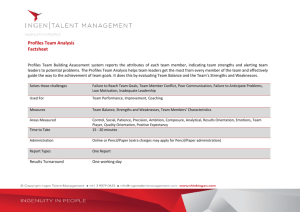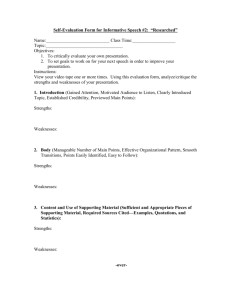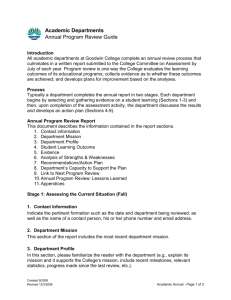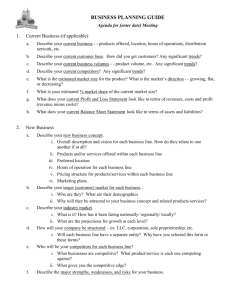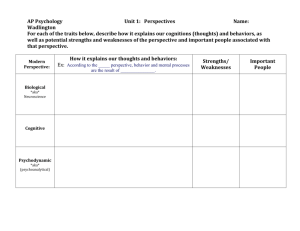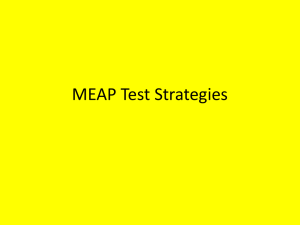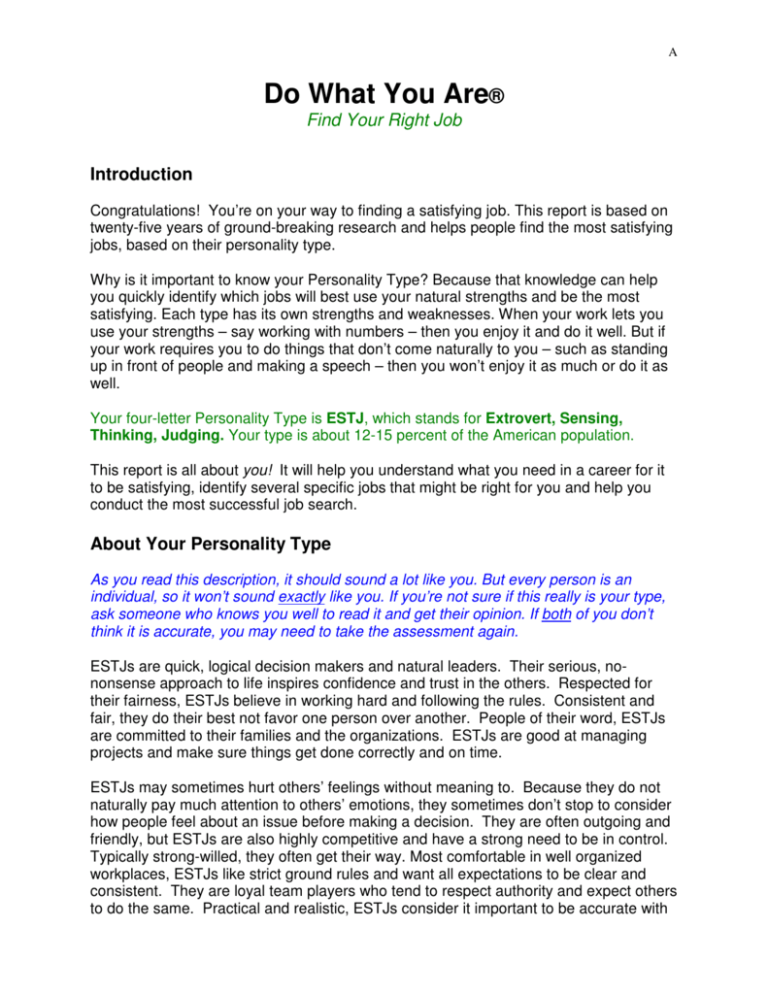
A
Do What You Are®
Find Your Right Job
Introduction
Congratulations! You’re on your way to finding a satisfying job. This report is based on
twenty-five years of ground-breaking research and helps people find the most satisfying
jobs, based on their personality type.
Why is it important to know your Personality Type? Because that knowledge can help
you quickly identify which jobs will best use your natural strengths and be the most
satisfying. Each type has its own strengths and weaknesses. When your work lets you
use your strengths – say working with numbers – then you enjoy it and do it well. But if
your work requires you to do things that don’t come naturally to you – such as standing
up in front of people and making a speech – then you won’t enjoy it as much or do it as
well.
Your four-letter Personality Type is ESTJ, which stands for Extrovert, Sensing,
Thinking, Judging. Your type is about 12-15 percent of the American population.
This report is all about you! It will help you understand what you need in a career for it
to be satisfying, identify several specific jobs that might be right for you and help you
conduct the most successful job search.
About Your Personality Type
As you read this description, it should sound a lot like you. But every person is an
individual, so it won’t sound exactly like you. If you’re not sure if this really is your type,
ask someone who knows you well to read it and get their opinion. If both of you don’t
think it is accurate, you may need to take the assessment again.
ESTJs are quick, logical decision makers and natural leaders. Their serious, nononsense approach to life inspires confidence and trust in the others. Respected for
their fairness, ESTJs believe in working hard and following the rules. Consistent and
fair, they do their best not favor one person over another. People of their word, ESTJs
are committed to their families and the organizations. ESTJs are good at managing
projects and make sure things get done correctly and on time.
ESTJs may sometimes hurt others’ feelings without meaning to. Because they do not
naturally pay much attention to others’ emotions, they sometimes don’t stop to consider
how people feel about an issue before making a decision. They are often outgoing and
friendly, but ESTJs are also highly competitive and have a strong need to be in control.
Typically strong-willed, they often get their way. Most comfortable in well organized
workplaces, ESTJs like strict ground rules and want all expectations to be clear and
consistent. They are loyal team players who tend to respect authority and expect others
to do the same. Practical and realistic, ESTJs consider it important to be accurate with
A
facts and pay close attention to details. They are particularly good at using resources
carefully, sticking to their budgets, and making careful investments.
ESTJs like traditional ways of doing things. Since they don’t particularly like change,
they may often question the need for it. They are rarely convinced by anything other
than experience, hard facts and strong reasoning.
Because ESTJs focus primarily on the present, they may not appreciate how their
actions may affect the future. They tend to make quick decisions, sometimes before
they have carefully considered all their options. And once they’ve made up their minds,
it may be difficult to get them to change them. When ESTJs slow down and take the
extra time to listen to others’ suggestions, they often make better choices for
themselves and others.
Below is a list of common strengths for people of your type. Some items on this list will
fit you better than others. Try to identify the five strengths that are most true for you.
This exercise will help you in two ways: to identify jobs that that uses your strengths,
and to be able to tell future employers what you have to offer them.
Your work-related strengths – what you probably do well:
•
•
•
•
•
•
•
•
•
•
Making practical, realistic decisions
Carrying out your commitments
Being tough when necessary
Ability to stay focused on the organization’s goals
Desire to get the job done right
Willingness to follow established rules and traditions
Ability to recognize what is impractical or inefficient
Good organizational skills and objective decision-making
Sense of responsibility - you can be counted on to do what you say you will
Common sense and ability to look at things realistically
Below is a list of common weaknesses for people of your type. Some items on this list
will fit you better than others. Try to identify the five weaknesses that are most true for
you. This exercise will help you in two ways: to identify things that don’t come naturally
to you that you need to work on, and to help you avoid repeating the same mistakes.
Your work-related weaknesses may include:
•
•
•
•
•
•
•
•
Not being patient with people who don’t follow the rules or procedures
Reluctance to embrace new, untested ideas
Not liking or being comfortable with necessary change
Little patience with approaches that take too long
Not being sensitive to how people may be affected by policies and decisions
Paying too much attention to the present, and not enough to the future
Not paying enough attention to others’ feelings as you work to meet your goals
A hard time listening to others’ views – and not interrupting
A
Below is a list of “Career Satisfiers” – those things which you need in a job for it to be
most satisfying. Try to identify the top five that are most true for you. This exercise will
help you compare different jobs to see which will be a better-fit.
What you need in a career for it to be satisfying. Doing work that:
1. Lets you work in an organized, efficient way toward your goals
2. Lets you use your skills to work on clear assignments, using your strong
reasoning powers
3. Is measured and evaluated fairly and objectively
4. Is done alongside other hardworking people who don’t bring their personal
problems to work and don’t expect you to share your personal feelings
5. Has practical uses and concrete results
6. Has clear expectations and a consistent organizational structure
7. Lets you be productive, organizing the needed steps, following established
procedures, and setting and meeting deadlines
8. Is done in a predictable, stable environment
9. Can be done with other people, and allows you to be in charge of yourself and
others
10. Lets you make decisions and have a good deal of control and responsibility,
where your opinions and experience are considered important
Some satisfying jobs for ESTJs:
Below is a list of several jobs that might be a good fit for many ESTJs. But you will enjoy
a job a lot more if it involves something you’re personally interested in. Try to identify at
least five jobs that you’d like to learn more about.
GREEN JOBS
•
•
•
•
•
•
•
•
•
•
•
•
•
•
•
•
•
•
Biofuels/Biodiesel Technology and Product Development Managers
Biofuels Production Managers
Geothermal Technicians
Hydroelectric Production Managers
Methane Capturing System Engineers/Installers/Project Managers
Solar Energy Installation Managers
Wind Energy Operations Managers
Wind Energy Product Managers
Automotive Engineers
Fuel Cell Engineers
Logistics Analysts
Logistics Engineers
Logistics Managers
Supply Chain Managers
Transportation Engineers
Energy Auditors
Energy Engineers
Carbon Credit Traders
A
•
•
•
•
•
•
•
•
•
•
•
•
•
•
•
•
Carbon Trading Analysts
Securities and Commodities Traders
Investment Underwriters
Manufacturing Engineering Technologists
Manufacturing Engineers
Mechanical Engineering Technologists
Robotics Engineers
Supply Chain Managers
Validation Engineers
Brownfield Redevelopment Specialists and Site Managers
Environmental Certification Specialists
Air Quality Control Specialists
Chief Sustainability Officers
Compliance Managers
Regulatory Affairs Managers
Regulatory Affairs Specialists
SALES/SERVICE
•
•
•
•
•
•
•
•
•
•
•
•
•
•
•
Sales (tangibles); computers, real estate
Cook
Pharmaceutical sales
Military officer
Regulatory compliance officer
Aviation inspector
Athletic coach
Athletic trainer
Construction and building inspector
Real estate appraiser
Hotel and motel manager
Environmental compliance inspector
Sound technician
Credit analyst
Funeral director
TECHNOLOGY/PHYSICAL
•
•
•
•
•
•
•
•
•
•
Engineer: mechanical/applied fields
Computer analyst
Auditor
General contractor
Farmer
Construction worker
Pharmacist
Clinical technician
Accounting internal auditor
Technical trainer
A
•
•
•
•
EEG technologist/technician
Paralegal
Network and computer systems administrator
Database administrator
MANAGEMENT
•
•
•
•
•
•
•
•
•
•
•
•
•
•
•
Project manager
Administrator
Database manager
Budget analyst
Health services administrator
Chief information officer
Bank manager/loan officer
Property manager: commercial/residential
Food service and lodging owner
Nursing director
Construction manager
Treasurer, controller, and chief financial officer
Private sector executive
Factory supervisor
Logistics and supply manager
PROFESSIONAL
•
•
•
•
•
•
•
•
•
•
•
•
•
•
•
Dentist
Physician: general medicine
Stockbroker
Judge
Teacher: technical/trades
Civil/mechanical/metallurgical engineer
Corporate finance lawyer
Electrical engineer
Primary care physician
Industrial engineer
Paralegal
Lawyer
School principal
Executive
Pharmacist
How to conduct a successful job search
You will be most successful in the job search if you use your strengths. Here is a
list of things that you can do to build on these strengths:
1. Organize and conduct an efficient search.
A
2. Make realistic decisions based upon known facts.
3. Be direct and honest when explaining how your skills and abilities will benefit
the employer.
4. Set and meet realistic job search goals.
5. Present yourself as a capable, stable candidate.
6. Use your large network of friends to find what jobs are out there.
Everyone has weaknesses. Here are some things you can do to overcome
weaknesses that are common in many ESTJs:
1.
2.
3.
4.
Avoid making decisions too quickly.
Consider new job search techniques as well as more traditional approaches.
Consider the long-range consequences in weighing job options.
Try to establish a connection with interviewers and not to be overly buttoneddown and businesslike.
5. Try to avoid being inflexible in job negotiations.
The Secret to Success…
Using your strengths is easy. The secret to success for an ESTJ is learning to:
Slow down, consider effects on people, and be flexible.
A
Do What You Are®
Find Your Right Job Report Exercise
This exercise will help you get the most from the Find Your Right Job Report.
Look at each section of your report and answer the following questions. Your answers
will help your counselor help you find the most satisfying job.
About Your Personality Type
What are the three most useful things you learned about yourself from reading this
section?
1. ________________________________________________________________
________________________________________________________________
2. ________________________________________________________________
________________________________________________________________
3. ________________________________________________________________
________________________________________________________________
Your work-related strengths – what you probably do well
Which three strengths do you think are your greatest?
1. ________________________________________________________________
2. ________________________________________________________________
3. ________________________________________________________________
Your work-related weaknesses may include
Which three weaknesses do you think cause you the most problems?
1. ________________________________________________________________
2. ________________________________________________________________
3. ________________________________________________________________
A
What you need in a career for it to be satisfying
Which are your top three “Career Satisfiers”?
1. ________________________________________________________________
2. ________________________________________________________________
3. ________________________________________________________________
Some satisfying jobs
Look at the list of jobs in your report. Write down five that you find interesting and would
like to know more about.
1. ________________________________________________________________
2. ________________________________________________________________
3. ________________________________________________________________
4. ________________________________________________________________
5. ________________________________________________________________
How to conduct a successful job search
Look at this section and write down three things you can do to help in your job search.
1. ________________________________________________________________
2. ________________________________________________________________
3. ________________________________________________________________
Copyright © 2010 SpeedReading People, LLC. All rights reserved.


